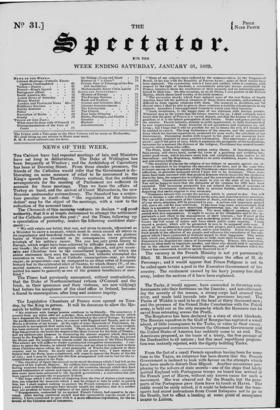THE Cabinet have had repeated meetings of late, and Ministers
have sat long in deliberation. The Duke of Wellington has
NEWS OF THE WEEK.
THE Cabinet have had repeated meetings of late, and Ministers have sat long in deliberation. The Duke of Wellington has been frequently at Windsor ; and the Archbishop of Canterbury has been at Downing Street. From these slender premises, the friends of the Catholics would infer that the Gosernment is de- liberating on some measure of relief to be announced in the King's speech on Thursday. Others contend, that the ordinary arrangements for the meeting of Parliament are sufficient to account for these meetings. Then we have the affairs of Turkey on hand, and the arrival of Count Maluscheviz, the new Russian ambassador extraordinary. The Standard has a conjec- ture peculiar to itself—that " the regulation of the tobacco duties" may be the object -of the meetings, with a view to the reduction of the assessed taxes. The Chronicle of this morning- ventures to declare " one good, authority, that it is at length determined to attempt the 'settlement of the Catholic question this yeaf ;" and the Times, following -up a speculation of yesterday, makes the following confident state- ment :— " We still retain our belief, that one, not given to recede, isiresolved as a Minister to carry a measure, which must as much exceed all-others in its importance and beneficial results to this realm, as his own glorious battle of Waterloo exceeded in its consequences every preceding triumph of his military career. The one has' only given liberty, to Europe, which might have been achieved by differ4nt means and differ- ent hands : the other will extinguish religious discord, and give unani- mity and Christian Jove to the consolidated' kingdom, of which the ablest statesmen have seen the necessity, but hitherto attempted the " execution in vain. The act of Catholic emancipation—now, we boldly augur,.in preparation—can be compared to no other event of European history but to the celebrated edict of Nantes, by which Henry IV, of im- mortal memory, restored peace to his distracted country, and trans.. mitted his name to posterity as one of the greatest benefactors of man- kind," The Times had previously announced, without contradiction, that the Duke of Northumberland (whom O'Connell and the Irish, in their ignorance and their violence, are now vilifying) had before his acceptance of the chief office in Ireland, become a. friend to emancipation, after long and anxious inquiry.


















